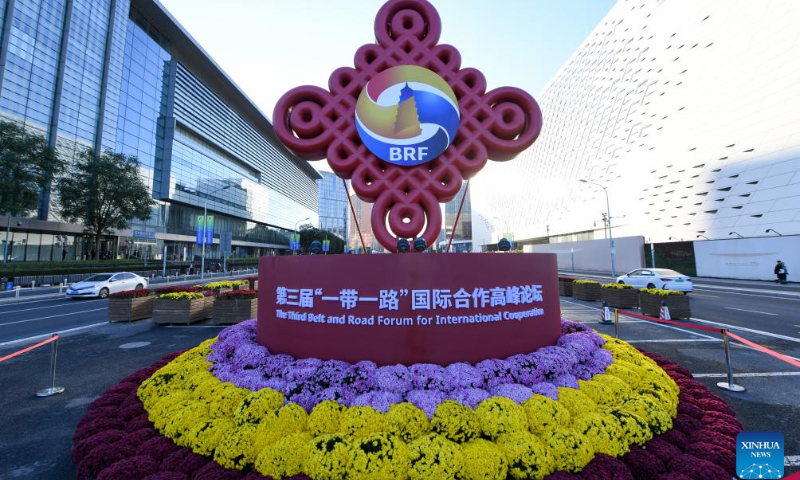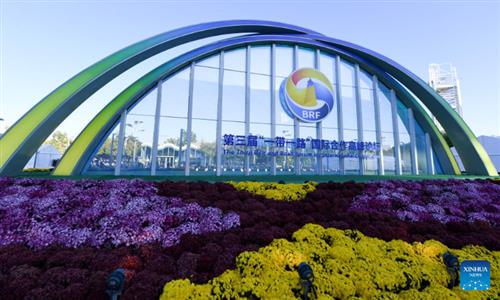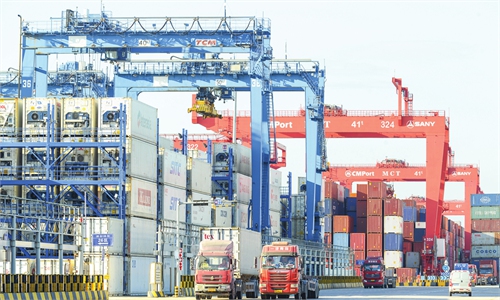
This photo taken on Oct. 14, 2023 shows a floral decoration for the third Belt and Road Forum for International Cooperation (BRF) near China National Convention Center in Beijing, capital of China. The BRF will be held from Oct. 17 to 18 in Beijing. (Xinhua/Ju Huanzong)
In the 12th century, Ismail Al Jazari, an engineer from the Middle East, created automated devices including mechanized wine servant. It was a remarkable invention back in the medieval time, manifesting the Middle East people's early quest for a futuristic high-tech lifestyle.
Now, after roughly a millennium, robots are coming in cohorts in the region.
In Saudi Arabia and the United Arab Emirates, Chinese-made intelligent logistics robots are "taking over" warehouses, automatically handling and sorting chunks of commodities. In the annual entertainment and sports festival "Riyadh Season," Chinese artificial intelligent(AI) algorithm-powered robots are wooing global tourists with interactive dialogues. In Dubai, co-built robots are patrolling the city's malls and tourist attractions.
Those sci-fi scenes are indicatives of how cities across the Middle East ascend in technological realm, a startling rise fueled by Chinese tech firms' growing investments under the Belt and Road Initiative (BRI) that not only translate the Muslim ancestors' robot dream into reality, but also inject new impetus into the region's economic diversification goal.
The bilateral AI cooperation further mirrors how economic ties flourish under the BRI, a global cooperation platform proposed by Chinese President Xi Jinping that carries forward the ancient Silk Road spirit to address "great changes unseen in a century."
This year marks the 10th anniversary of the BRI. On the new journey toward another "golden decade" for BRI industry insiders believed that the China-proposed initiative will continue prevailing, progressing toward newly emerging cooperation in fields such as technological innovation, digital and green energy. Greater emphasis will be prioritized on high-quality and sustainable development, with more dynamic adaptations to an evolving international context.
The undertone of BRI, which champions openness and inclusiveness, is also envisioned to carry more significant ramifications amid more challenging geopolitical landscape in the next decade.
Observers said the initiative will help push the world into a joint path toward modernization, countering the Western hegemonic practices that could squeeze the development spaces of the Global South. The BRI outlook will "shine like a diamond" in the next stage, analysts said, proving itself to be one of the most far-reaching development initiatives in human history.
"We hope the 10th anniversary of BRI can be a new starting point for high-quality Belt and Road cooperation and galvanize efforts to build a global community of shared future," Chinese Foreign Ministry spokesperson Mao Ning said on Wednesday.
A road of innovation
In a congratulatory letter to the first Belt and Road Conference on Science and Technology Exchange in November, Xi said the third Belt and Road Forum for International Cooperation (BRF) was successfully held, ushering in a new stage of high-quality development for the BRI, of which sci-tech cooperation is an important part.
In Saudi Arabia, Chinese AI enterprises - standing at the culminated development of BRI in the first decade - are planning to bolster tech ties with the local markets.
China-based SenseTime has reached a deal with Saudi Company for Artificial Intelligence (SCAI) to jointly build a state-of-the-art AI lab in Saudi Arabia, to train local high-end AI talents and advance the country's AI-tech ecosystem, a SenseTime spokesperson told the Global Times.
"We have launched multiple programs to cultivate the local AI workforce," the spokesperson said, giving examples of the immense economic, social benefits to deepening AI cooperation in fields including digital infrastructure, smart city, smart tourism, smart industrial park, healthcare, and autonomous driving.
The tech cooperation leads to win-win result. While Saudi Arabia has the capital and is in dire need of technological input, Chinese companies offer cutting-edge technology at an affordable price, and China doesn't put any conditions or ask extra pay for the technology, industry insiders noted.
"China and Saudi Arabia have built solid BRI multi-faced cooperation in the past 10 years. So the Middle East country has the natural strategic trust to deepen tech collaboration with China under BRI framework - rather than the US and other Western countries," Zhou Rong, a senior researcher at the Chongyang Institute for Financial Studies at Renmin University of China, told the Global Times on Monday.
Zhou pointed out the logic will play out with other BRI partner countries, as they could easily draw upon the successful experiences in implementing BRI projects in the first decade. "It sends a positive signal on the BRI voyage in the second stage."
Similar to SenseTime, an array of Chinese companies is proactively scaling up tech investments in BRI partner countries, and promoting the innovation fruits to benefit people globally.
Chinese leading new energy vehicle (NEV)-maker BYD announced last week that it will build an assembly plant in Hungary, which is its first European EV production factory. Hungary was the first European country to sign a BRI cooperation document with China in 2015.
Maya Majueran, director of Belt & Road Initiative Sri Lanka (BRISL), told the Global Times that China has emerged as global leader in sectors such as clean energy, AI, 5G, and NEV.
As the applications of those technologies have already contributing significantly to the development of the world's second-largest economy, in the next stage, "China's experience, know-how and technology transfer through BRI cooperation will be valuable to other countries. It will help them to release the potential for innovative growth," he noted.
According to a document China released in November, technological and digital cooperation, as well as green development are also listed among the new sectors for BRI cooperation in the next decade.
A path to global modernization
At the opening ceremony of BRF in October, President Xi announced eight major steps China will take to support high-quality Belt and Road cooperation, including continuing to promote green development. He vowed that China will implement the Green Investment Principles for the Belt and Road.
"Signaling that China will commit to financing green and sustainable infrastructure as part of the BRI could enhance the capacity of the investment program to be in line with the efforts by the BRI countries to decarbonize their economies," Leslie Maasdorp, vice president and chief financial officer of the New Development Bank, told the Global Times.
In Southeast Asia, Chinese firms are accelerating the region's green transformation. In November, state-owned Power Construction Corporation of China (PowerChina) signed a deal with Thai enterprise to jointly build a 1,000-megawattwind power project in Laos, which is said to be the largest in Southeast Asia by completion.
PowerChina noted to the Global Times the BRI's critical role in promoting global clean energy cooperation in the new stage and "translating green development into economic drives."
By 2040, BRI is projected to boost world GDP by $7.1 trillion per year, and this raises world GDP by 4.2 percent of likely GDP in 2040, according to a study by London-based Centre for Economics and Business Research.
Observers also noted that BRI's extensive emphasis on the novel fronts is an agenda that the West has long neglected, or perhaps not willing to make any contribution out of hegemonic mindset.
"In a divergence with the donors-dominated, Western-led model of international cooperation, the BRI will offer a clear blueprint on the common path to global modernization, especially for developing countries some of which otherwise could be left out in the next round of technological revolution," Zhou said.
Zhou explained that the path to global modernization is underpinned by BRI's ultimate goal to build a global community of shared future.
"It is not about superficially prioritizing the interests of an individual country and achieving development through competition. The global interests transcend that of any single nation and matter as a whole, and so what BRI pursues in the next stage is balanced, common development through cooperation and joint governance," Zhou said.
Industry insiders noted that dynamic adjustments on BRI implementation are necessary to adapt to an ever-evolving global environment, which is envisaged to be more complicated amid intensified geopolitical power wrestling, rising global economic uncertainties, supply chain fragmentation and enlarging divisions in the coming years.
In light of the international context, BRI will see increasing importance in countering rampant hegemonic moves and challenging the current "unfair and disproportionate" global order, according to Majueran.
2024 will mark the beginning year of the second decade of BRI journey. Zhou compared the development of BRI as a "Long March," noting that the vision's implementation is long-term, systematic and of large-scale.
"We're just at the start. Moving forward, there are roadblocks, but the prospect will shine like a diamond," Zhou noted.




